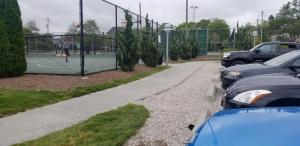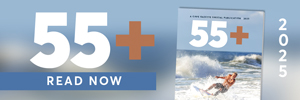With their pastels, multicolors, basic blacks and patterns, they’re like butterflies, alighting gently in the grass, blowing with bay breezes or facing harsher fates along Coastal Highway, streets and paths – but they may carry COVID-19.
Various types of face coverings are being lost or discarded by ear-looped locals and masked-up migrators. “Blue. Pink. Usually they’re not cloth or medical grade,” said Dr. Angela Saldarriaga, a family physician from Wilmington, describing the face coverings she saw while cycling on the Gordons Pond Trail and Rehoboth Beach streets when her family vacationed here at the end of July.
From Cool Spring Road where two masks roasted on asphalt, to Minos Conaway Road, where a respirator-style mask rested in the grass near Edgewater Estates, to the stretch of Coastal Highway between Dewey’s beaches and Bethany, masks are there. Or were. May be again.
Victor Loper, a 34-year-old Lewes resident, recently spied one in the parking lot at Lewes Canalfront Park. “I knew it as soon as I got out of the car,” said Loper, who gets up early three days per week to enjoy the boats, breezes and waterfront scenery during basketball court workouts.
Fortunately, even with tens of thousands of locals and visitors wearing face coverings, sightings of discarded masks are still fleeting and infrequent, if not as special as seeing a Milbert's Tortoiseshell butterfly here.
“We saw one, not many,” said Pam Daskalakis while enjoying beach time with her kids. Her 14-year-old daughter, serving as consulting maskologist, confirmed that wayward mask sightings were sparse. The lone discard was on a side street in Rehoboth, where the pair spotted well-masked workers at Funland diligently wiping down ropes to help keep scheduled guests safe, too.
“People are good down here,” Daskalakis said about masking up.
Even so, a few face coverings are bound to escape, including the black one lying on Second Street in Lewes, just steps from the prime outdoor table that twins Erin Coldiron and Lauren Piotrowski shared at Half Full Aug. 1, after heading down from West Chester, Pa. Like that mask, the 36-year-olds had escaped, in their case for a day trip that included an all-American salad and brie-and-berry pizza.
“This is my first time eating out since COVID,” Lauren said, smiling between bites of salad.
Presumably, like other lost or haphazardly discarded masks in the Cape Region, the Second Street mask’s virus-protection life was over. But, what can visitors or locals do if there are no salad tongs, butterfly nets or gloves handy?
“That’s a very good question,” said Dr. Saldarriaga. In the office, she and her staff dispose of masks as medical waste. After thinking for a moment, she concluded most public discards could be put in the trash – and that handlers should wash their hands after cleanup duty.
She was right: Delaware Health and Social Services guidance on cloth face coverings says wearers should practice strict hand-washing before and after touching a mask, which would apply to any type, found anywhere.
In fact, trash-finding fanatic Jill Fredel, DHSS communications director, said she picks up parkside masks – by their elastic bands or ties – and puts them in the garbage, then sanitizes her hands.
“That’s the latest trend in trash – disposable masks,” Fredel joked. And certain cloth ones, too, most likely.
The Centers for Disease Control says to discard cloth masks that are stretched, damaged, or don’t cover the mouth and nose or stay in place. Detailed COVID-19 personal safety practices from Johns Hopkins University call for cloth face coverings to be washed daily or discarded if soiled, damaged or visibly contaminated, and for disposable masks to be placed in the trash after not more than one day’s use or if damaged.
So guidance points in one direction for wandering discards: The nearest trash can.
Research suggests porous materials likely absorb life-sustaining moisture and trap viruses like COVID-19. So, though knowledge is still evolving, masks blowing through Sussex County are probably not huge sources of contamination.





















































